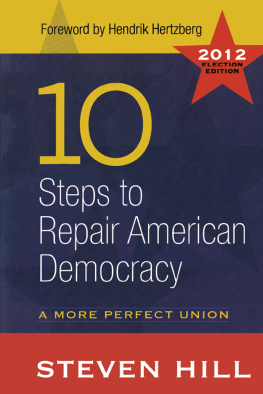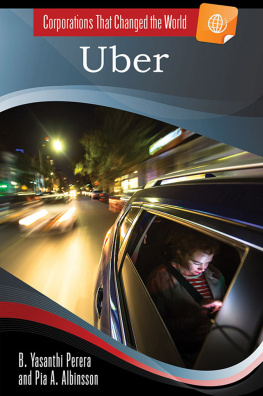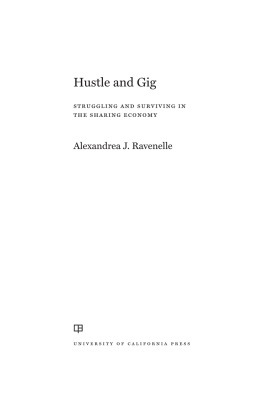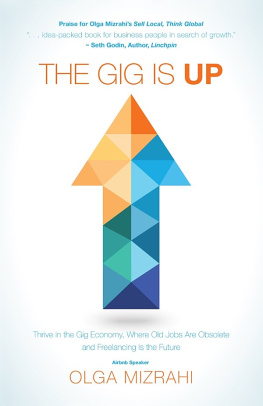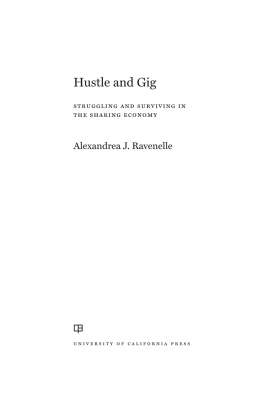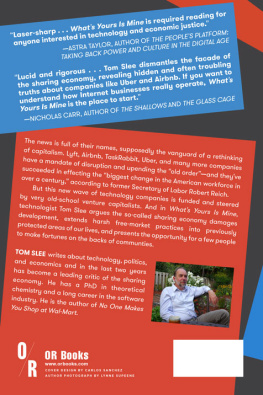Raw Deal
How the Uber Economy and Runaway Capitalism are Screwing American Workers
Steven Hill

St. Martins Press
New York
Thank you for buying this St. Martins Press ebook.
To receive special offers, bonus content, and info on new releases and other great reads, sign up for our newsletters.

Or visit us online at us.macmillan.com/newslettersignup
For email updates on the author, click here.
The author and publisher have provided this e-book to you for your personal use only. You may not make this e-book publicly available in any way. Copyright infringement is against the law. If you believe the copy of this e-book you are reading infringes on the authors copyright, please notify the publisher at: us.macmillanusa.com/piracy .
To Maria Fernandes, former Dunkin Donuts worker and now a star in the sky, showing us what we stand to lose; to my nieces and nephews, in the hope that the world you inherit will still provide as good a life as your parents and grandparents knew; and of course to Lucy, always to Lucy.
How do we eradicate the barriers which separate substantial minorities of our citizens from access to education and employment on equal terms with the rest? How, in sum, can we make our free economy work at full capacitythat is, provide adequate profits for enterprise, adequate wages for labor, and opportunity for all?
President John F. Kennedy, 1962
Im sitting in San Francisco, looking out my window into the chilly, grey fingers of fog threading through the upper red spans of the Golden Gate Bridge. Im watching the world change before my eyes. The number of revolutionary inventions and innovations emanating from the Bay Area is astonishing: Google eyeglasses that turn your head into a mobile computer and surveillance camera; self-steering cars that dont need a driver; search engines that track your personal interests (whether you want them to or not); robots that use increasingly sophisticated software and algorithms to take on tasks once considered exclusively human; stem cell research and regenerative medicine that, like Dr. Frankenstein, seek to transform living tissue.
Of course, already ubiquitous are the wireless Harry Potter wands that put in the palm of our hands everything from a communications revolution (phone/text/email/tweets) to an information revolution (24/7 news/weather/entertainment) to a creativity revolution (camera/video/audio/apps) to a powerful GPS system that makes it virtually impossible to get lost. We have unprecedented capacity to record, publish and mythologize our every waking moment in our bid for our 900 billion nanoseconds (i.e., 15 minutes) of fame. As we became seduced by the iPhone and Androids charms, few of us realized that those same devices would provide the means for the government, as well as corporations, to spy on us in ways the Nazi Gestapo or Stalins NKVD could never have imagined. And now these devices have spread outward from the tech nirvana in the Bay Area to every corner of the world. The genie has been let out of the bottle, with seemingly no way to stuff it back.
The Bay Area long has been an epicenter of disruption and revolution, whether the source was the mad gold diggers of 49, the Beat poets, womans lib, gay marriage, the Black Panthers, antiwar protests, the free-speech movement, free love, hippie flower power, LSD or psychedelic music. In trendsetting San Francisco, the future has always been now. But today the revolution is of a decidedly different nature. Brand names like Google, Apple, Oracle, Facebook and Twitter dominate the accelerating digital arena, their companies synonymous with business innovation, creativity and commercial success. Upstart companies are finding ways to load software and algorithms into just about everything, from automobiles to wristwatches, from drones to home appliances, from music to movies, from hospitals to the Pentagon, from agriculture to the assembly line floor. Robots and automation are boosting productivity to unimaginable levelsand human redundancy along with it, as the machines threaten to replace the humans.
In short, the science fiction of yesterday is racing up and down Highway 101 between Silicon Valley and the City, like a high-tech steamroller cruising at Indy 500 speeds. The tidal wave of innovation and GDP maximizers sweeping the country seeks nothing less than to transform the ways we work, communicate, create, inform, educate, entertain, shop and travel. The sweep of the disrupters is historic; their ambitions are total. Tech trendsetter and venture capitalist Marc Andreessen says, quite simply, Software is eating the world.
Now from the techno-wizards comes the latest groundbreaking trend, which appears destined to further reshape the ways we work and live. Its called the sharing economy, sometimes referred to as the peer-to-peer, collaborative-consumption or on-demand economy. The sharing economy is hot, a darling of venture capitalist investors as well as the media, which reports in rapturous tones on its every new development, including astounding company valuations in the tens of billions of dollars for companies that have yet to make a penny of profit. Its signature companies like Uber, Airbnb, TaskRabbit, Elance-Upwork, Lyft, Zaarly, Etsy, Washio, Postmates and dozens more, which have all incubated in the San Francisco Bay Area, are being hyped as the new avatars of the way things will be. These Internet-based companies deploy online Web- and app-based platforms to directly connect buyers and sellers of goods, labor and services, cutting out any middle person in a way that has never been possible before. Amazon and eBay pioneered this type of technology initially for selling books and used stuff; now the sharing economy companies are extending this powerful capability into the selling of dozens more services, goods and labor.
But its revolution is more than merely commercialits leading visionaries say that the sharing economy offers a viable alternative to laboring in the trenches of Corporate America. Instead of selling your soul to the Man, you will be able to work for yourself as your own microentrepreneur. With no middle man between you and your customers, the work will come directly to your computer, via the Web or via apps on your smartphoneall you have to do is wait and check your app feed for the next paying gig. You will no longer be a lowly grunt, climbing the ladder to enrich someone elseyou will run your own microbusiness, able to work when you want, doing what you want. This is why its also called the DIY (do-it-yourself) economy, replacing the old postindustrial economy by liberating workers to become independent and work for ourselves, with promises that each of us can become the CEOs of our own freelancing business.
Yes, according to the techno-visionaries, theres gold in them thar hills. Brian Chesky, a former bodybuilder who is Airbnbs young 34-year-old billionaire cofounder and CEO, likes to cast his company as saving the world. I think were in the midst of a revolution, he told a conference in San Francisco.
Sitting here in San Francisco, I have a front-row seat at the epicenter of this latest earthquake. But as the future that the tech geniuses have planned for us comes slowly into view, it looks increasingly alarming. Its not just the many people evicted, including elderly and disabled tenants, to clear entire apartment buildings to make rooms available for tourists via Airbnb, even as Airbnb has disputed its obligation to pay local hotel taxes; or the desperate workers scrambling like low-rent braceros arms for hireon jobs found via TaskRabbit, Elance-Upwork, CrowdFlower and other job brokerage websites, sometimes for less than minimum wage (according to some workers); or the middle- and low-income households being forced to leave the Bay Area in a tech-driven Trail of Tears because they no longer can afford the escalating costs; or that Uber, which is valued at $51 billionlarger than Delta or United Airlines, and approaching General Motors and Fordhas incorporated more than 30 different foreign subsidiaries, many of them no more than mailboxes in the Caribbean, as low-tax havens to greatly reduce its U.S. tax obligations.


